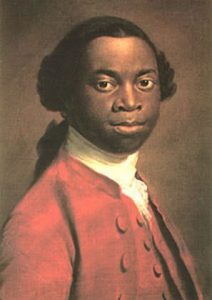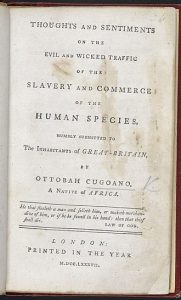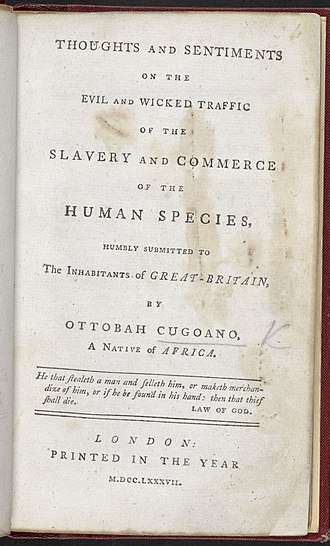
A portrait of Ottobah Cugoano in London

A copy of Cugoano’s Autobiography
The source at hand is Ottobah Cugoano’s autobiography, a primary source – “Thoughts and Sentiments on the evil of slavery”, published in 1787, it recounts his experiences of life in slavery. Copies of his autobiography were sent to George III, Edmund Burke and other politicians and people in effective power, the source was originally created to describe the foul and destructive nature of the slave trade, where Cugoano publicly calls for abolishment of the slave trade and the freeing of all slaves, making his intended audience the white upper-class supporters of the slave trade, those who have the authority to positively impact the demolition. Ottobah Cugoano, also known as John Stuart was born circa 1757 in Ajumako, West Africa (present day Ghana). As a child he was captured and shipped to Grenada where he was sold as a slaved and forced to work on a plantation where he experienced “the most dreadful scenes of misery and cruelty.” Cugoano remained and worked in the West Indies until he was purchased by an English Merchant and brought to England in 1772 where he was granted his freedom and baptized, becoming ‘John Stuart. Within the next decade, he was to become a prominent leader of London’s Black community, acquainted with British political and cultural figures he was the first African to publicly demand the total abolition of the slave trade and the freeing of all slaves.
In his autobiography, Cugoano confidently conveys black radicalism, he shows understanding towards his good fortune post enslavement, however as Edwards and Dabydeen argue, importantly “never allows his argument to slip into the common hypocrisy of slave owners, that the benefits of Christian conversion outweigh the sufferings of slavery.” (page 40) As a free and educated man, he never forgets the tortuous and traumatic events which he encounters. In ‘Thoughts and Sentiments on the evil of slavery” Cugoano criticises and opposes religious and populous pro-slavery arguments, with a prominent tone throughout of bitterness and anger he demands the immediate abolition of slavery, while calling for punishment for slave holders. Cugoano is intelligently aware that the abolition of slavery in British colonies will only create white deceitfulness.
Problems within this text arise throughout with his consistent use of metaphoric language tainting the severity of the points he is wishing to prove. There is evidence that there was a biographer involved within the production of his autobiography, another British abolitionist, Olaudah Equiano, who extensively revised Cugoano’s writing before its publication, which I find to lessen the accuracy of his individual recounts throughout and heighten the political agenda. Yet I do find Cugoano’s writing convincing, the anger and bitterness in his tone, persuasive. The effectiveness of his life before slavery, the cruel and savage experience of his time in slavery and his constructed plan to achieve the emancipation of all slaves convinces the reader to encourage and support his actions.
The autobiography includes a letter written by Cugoano 1791 to Granville Sharp, a campaigner to for the abolishment of the slave trade which discusses arrangements for the transport of free blacks in Nova Scotia post American Wars of independence. The significance of this letter lies within Cugoano’s undeniable efforts and strive which show as evidence how committed he was to the cause. (page 52)
Relevant related works which have shown useful context and knowledge are Ignatius Sanchos letters, an Afro-British author in the 18th century who was sold into slavery in Britain to three sisters as an infant, wrote letters as ‘conscious strategies of protest’, he wasn’t subject to extreme forms of slavery like Cugoano, however the mere prejudices he received due to the colour of his skin made him conscious of his African origins, and thus, creating writings and memoirs of his experiences. (I have linked the chapter on Sancho. page 24)
This week’s topic of the 18th century black community: slaves, workers and writers fits into the theme of Cugoano’s autobiography as it recounts precise and personal experiences of a slave, the brutality and unrelenting torture which he endured in his early life due to the slave trade. The power of his writing in Britain has allowed a fraction of understanding of the hardships faced when struggling to reach emancipation of all slaves.
https://ebookcentral.proquest.com/lib/stir/reader.action?docID=6141537&ppg=56 – link to chapter on Sancho
